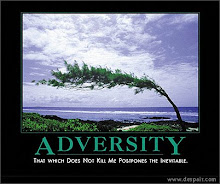Breast cancer screening has greatly improved the ability to find very small tumors; mine was only 2mm in size, and showed up on my yearly screening mammogram as a concentration of white dots, called microcalcifications, indicating an area of rapid cell turnover. The tumor wasn't found at my OBGYN exam a few weeks before; it would have taken months before it had grown large enough to be felt.
My tumor had already reached the invasive stage; it had broken through the breast duct, and was invading the surrounding tissue. At this point, the cancer cells have had a chance to reach other areas of the body, possibly creating secondary tumors. If the patient is fortunate, there has been no metastases, or tumor formation at other sites, and the cancer cells which did migrate elsewhere have been killed by the patient's immune system.
People have asked me how I feel about undergoing biopsies, 2 lumpectomies, 6 weeks of radiation, several screening scans and MRIs, and taking anti-cancer meds for a 5-year course when there is a 30% chance that my cancer wasn't deadly to begin with.
My response is that there is a 70% chance that my invasive cancer would have killed me, so I am very happy that it was found so early. If I had not gotten my yearly mammograms as recommended, my cancer might have spread to my lymph nodes, greatly decreasing the odds of my survival. Another advantage is that my node-negative status meant that I avoided needing chemotherapy, and I am very grateful for that.
I don't feel that I should have delayed treatment, hoping that my cancer would resolve itself. Once you find out that you have cancer, you just want it out of your body. It would be difficult, if not impossible, to just "do nothing" when you're diagnosed, unless there is an additional means of confirming that the cancer you have is indeed the non-fatal type.
My cancer was Stage 1, but even cancers this small, and some at Stage 0 (non-invasive) have proven deadly. There is so much that we still don't know about what causes some cancers to grow, and others to become dormant, or even totally disappear.
So, until researchers can determine which breast cancers are non-fatal, women shouldn't forego being screened. The ACS is standing by its recommendation of yearly mammograms for women over 40. That is vital for us to remember amid all of the current controversy.


